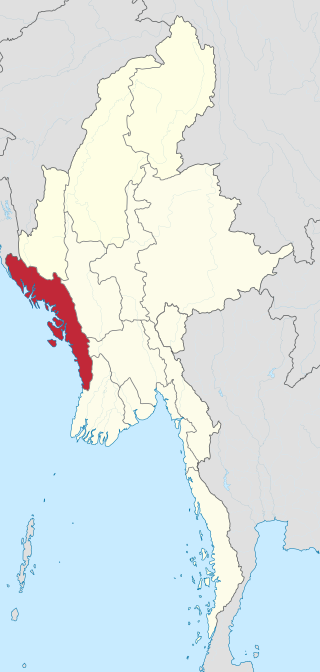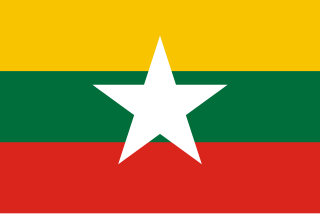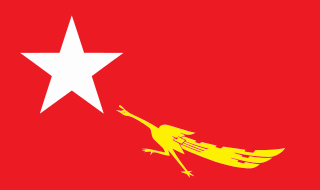
Myanmar, officially the Republic of the Union of Myanmar and also rendered Burma, is a country in Southeast Asia. It is the largest country by area in Mainland Southeast Asia and has a population of about 55 million. It is bordered by India to its west, Bangladesh to its southwest, China to its northeast, Laos and Thailand to its east and southeast, and the Andaman Sea and the Bay of Bengal to its south and southwest. The country's capital city is Naypyidaw, and its largest city is Yangon.

Historically strained, Myanmar's foreign relations, particularly with Western nations, have improved since 2012. Relations became strained once more in 2017 with the Rohingya genocide and due to the 2021 Myanmar coup d'état. Myanmar has generally maintained warmer relations with near states and is a member of the Association of Southeast Asian Nations.

Rakhine State, formerly known as Arakan State, is a state in Myanmar (Burma). Situated on the western coast, it is bordered by Chin State to the north, Magway Region, Bago Region and Ayeyarwady Region to the east, the Bay of Bengal to the west and the Chittagong Division of Bangladesh to the northwest. It is located approximately between latitudes 17°30' north and 21°30' north and longitudes 92°10' east and 94°50' east. The Arakan Mountains or Rakhine Yoma separated Rakhine State from central Burma from North to South. Off the coast of Rakhine State there are some fairly large islands such as Ramree, Cheduba and Myingun. Rakhine State has an area of 36,762 square kilometres (14,194 sq mi) and its capital is Sittwe.

Human rights in Myanmar under its military regime have long been regarded as among the worst in the world. In 2022, Freedom House rated Myanmar’s human rights at 9 out 100.

The Rohingya people are a stateless ethnic group who predominantly follow Islam and reside in Rakhine State, Myanmar. Before the Rohingya genocide in 2017, when over 740,000 fled to Bangladesh, an estimated 1.4 million Rohingya lived in Myanmar. Described by journalists and news outlets as one of the most persecuted minorities in the world, the Rohingya are denied citizenship under the 1982 Myanmar nationality law. There are also restrictions on their freedom of movement, access to state education and civil service jobs. The legal conditions faced by the Rohingya in Myanmar have been compared to apartheid by some academics, analysts and political figures, including Nobel laureate Bishop Desmond Tutu, a South African anti-apartheid activist. The most recent mass displacement of Rohingya in 2017 led the International Criminal Court to investigate crimes against humanity, and the International Court of Justice to investigate genocide.

The National Coalition Government of the Union of Burma was an administration which claimed to be the government in exile of Burma (Myanmar). It had its headquarters in Rockville, Maryland, United States. It was formally established in December 1990, with Sein Win as its first prime minister. It was dissolved in September 2012.

The Irrawaddy is a news website by the Irrawaddy Publishing Group (IPG), founded in 1990 by Burmese exiles living in Thailand. As a publication produced by former Burmese activists who fled violent crackdowns on anti-military protests in 1988, it has always been closely associated with the pro-democracy movement, although it remains unaffiliated with any of the political groups that have emerged since the 8888 Uprising.
Maung Zarni is a Burmese educator, academic, and human rights activist. He is noted for his opposition to the violence in Rakhine State and the Rohingya genocide. Zarni is a co-founder of several activist platforms, including the Free Burma Coalition (1995-2004), the Free Rohingya Coalition (2018-present), and Forces of Renewal Southeast Asia (2018). He is also a Fellow at the Documentation Center - Cambodia, specializing in genocide, and serves as an advisor to Genocide Watch.
Maung Maung is a Burmese trade unionist. During his studies, he earned a Bachelor of Science in geology.

The United States Campaign for Burma (USCB) is a U.S.-based membership organization that evolved out of the Free Burma Coalition founded by Maung Zarni. Founders were Jack Healey, who provided fiscal sponsorship to the organization from founding until it finally obtained its own nonprofit status in 2008, Jeremy Woodrum, and Dan Beeton. It is dedicated to empowering grassroots activists around the world to bring about an end to the military dictatorship in Burma. Through public education, leadership development initiatives, conferences, and advocacy campaigns at local, national and international levels, USCB works to empower Americans and Burmese dissidents-in-exile to promote freedom, democracy, and human rights in Burma and raise awareness about the egregious human rights violations committed by Burma's military regime.

Myanmar (Burma) and the United States had a diplomatic contact prior to the British colonial period. They established formal diplomatic relations in 1947 in anticipation of Burma's independence.
The 1999 Myanmar Embassy siege of 2 October 1999 was the seizure of the Burmese embassy in Bangkok, Thailand. A group of Burmese dissidents from the Vigorous Burmese Student Warriors (VBSW) and allegedly God's Army stormed the Burmese embassy and held 89 people, including embassy staff, Burmese nationals, foreigners, and Thai citizens. All hostages were released unharmed and the hostage takers escorted to the Burmese-Thai border by Thai authorities.

The 88 Generation Students is a Burmese pro-democracy movement known for their activism against the country's military junta. Many of its members were imprisoned by the Burmese government on charges of "illegally using electronic media" and "forming an illegal organisation". A number of Western governments and human rights organisations called for the release of group members on the grounds that they were political prisoners.

Myanmar and the Philippines are both members of the Association of Southeast Asian Nations (ASEAN). Formal bilateral and diplomatic relations of both countries established in September 1956. Myanmar has an embassy in Manila and the Philippines maintains its embassy in (Yangoon) and later Rangoon.

The Rohingya genocide is a series of ongoing persecutions and killings of the Muslim Rohingya people by the military of Myanmar. The genocide has consisted of two phases to date: the first was a military crackdown that occurred from October 2016 to January 2017, and the second has been occurring since August 2017. The crisis forced over a million Rohingya to flee to other countries. Most fled to Bangladesh, resulting in the creation of the world's largest refugee camp, while others escaped to India, Thailand, Malaysia, and other parts of South and Southeast Asia, where they continue to face persecution. Many other countries consider these events ethnic cleansing.

Violent clashes have been ongoing in the northern part of Myanmar's Rakhine State since October 2016. Insurgent attacks by the Arakan Rohingya Salvation Army (ARSA) have led to sectarian violence perpetrated by Myanmar's military and the local Buddhist population against predominantly Muslim Rohingya civilians. The conflict has sparked international outcry and was described as an ethnic cleansing by the United Nations High Commissioner for Human Rights. In August 2017, the situation worsened and hundreds of thousands of refugees fled Myanmar into Bangladesh, with an estimated 500,000 refugees having arrived by 27 September 2017. In January 2019, Arakan Army insurgents raided border police posts in Buthidaung Township, joining the conflict and beginning their military campaign in northern Rakhine State against the Burmese military.

Za Hlei Thang was a Burmese politician who was elected Member of Parliament as the Chin National League for Democracy candidate in the 1990 Myanmar general election. After the 1990 election, he fled Burma after the State Law and Order Restoration Council accused him of breaking the 1962 Printers and Publishers Registration Act, Article 20. While in exile, he served as Chairman of the Chin League for Democracy, a "Chin party in exile". He also served as Minister of Social Welfare and Development and Minister of Health and Education at the National Coalition Government of the Union of Burma which is a "government in exile" led by Dr. Sein Win. He also served as Chairman of the Chin National Front which is a Chin insurgent group in Myanmar (Burma). He dedicated his life in the Chin national movement.
Truth and reconciliation in Myanmar refers to the examination of human rights abuses in Myanmar, particularly involving those suffered by the Rohingya people. From a coup d’état in 1962 to a general election in 2010, Myanmar was controlled by a military regime. The junta was officially dissolved in 2011 into a civilian government, but there are lasting effects from the decades of military rule. Currently, the income gap in Myanmar is one of the largest in the world, and there are claims that many members of the previous regime continue to hold positions of power. In 2012, U.N. Special Rapporteur Tomas Ojea Quintana called on the creation of a truth commission by Myanmar to look into the human rights abuses committed by the previous government's rule. Quintana also called for an "independent and credible investigation" into the conflict between the Rakhine Buddhists and the Rohingya Muslim minority. In 2015, the Network for Human Rights Documentation Burma (ND-Burma) came out with a report that called for the acknowledgement and reparation for both crimes committed under the military junta, and the abuses currently ongoing.

Nay San Lwin is a prominent Rohingya political activist from Myanmar. He is a prolific commentator on Rohingya issues on radio, television channels and other mainstream media outlets. He was publicly attacked by the Myanmar presidential office and state counsellor's office for his role in getting out news about military atrocities in Northern Rakhine State.
Thuzar Maung, sometimes spelled as Thu Zar Moung, is a Burmese refugee activist. Born into a Muslim family in Myanmar, she fled the country in 2015 following the increased persecution of Muslims there, eventually receiving refugee status in Malaysia. A supporter of the National Unity Government of Myanmar and a critic of the Tatmadaw, Thuzar Maung has also been a vocal activist for the rights of Burmese refugees and migrants living in Malaysia. On 4 July 2023, Thuzar Maung and her family were abducted by a group of unidentified men from their home in Selangor; their whereabouts remain unknown as of October 2024.












